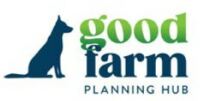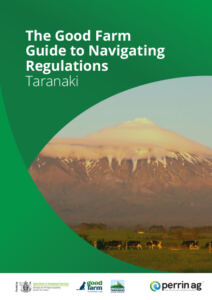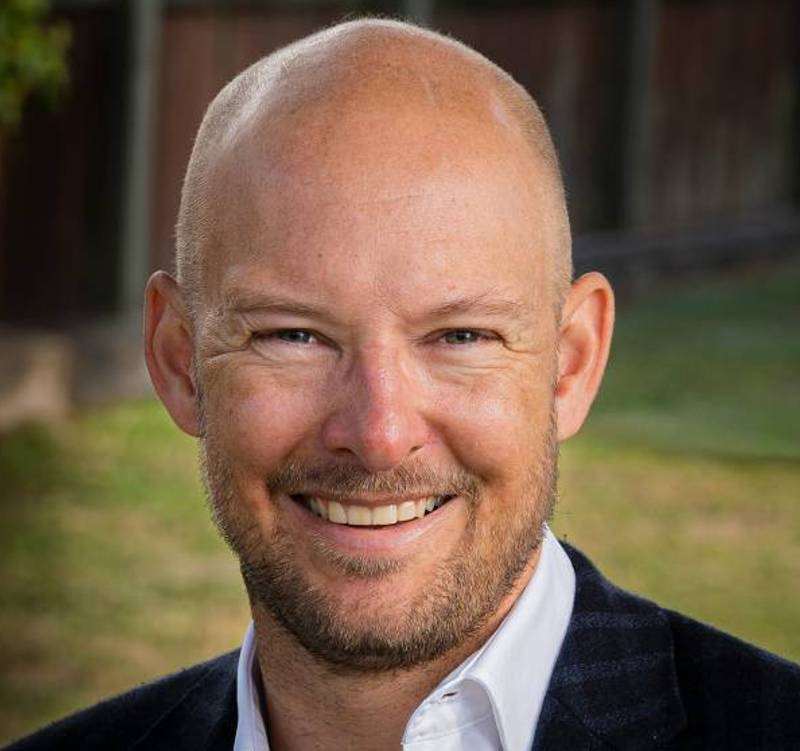Empowering Farmer Compliance
Taranaki Good Farm Guide to Navigating Regulations
Reference Guide & Webinars

Complete the form below to access the Taranaki Good Farm Guide to Navigating Regulations reference guide & webinars.
Once you submit the form, you will have access to both the guide download, and the links to reserve your spot at the webinars – or watch recordings of the live webinars.
Thank you for requesting access to the reference guide & webinars.
IMPORTANT: Make sure you save the PDF document to a safe location to access at a later date.
Taranaki Webinars
Freshwater Part 1
Tuesday 7 May, 12.15-1.00pm
Introduction to the freshwater legislative landscape, freshwater farm plan and critical source area regulations
Freshwater Part 2
Tuesday 14 May, 12.15-1.00pm
Introduction to effluent, stock exclusion and works around waterways regulations.
(We strongly recommend you watch Freshwater Part 1 before viewing)
Animal welfare & people
Tues 21 May, 12.15-1.00pm
FAQs
What is the status of Freshwater Farm Plan (FWFP) regulations?
The Freshwater Farm Plan (FWFP) regulations require that farms submit a FWFP to a certifier within 18 months of the regulations taking effect in their area. This is the requirement as laid out in the Resource Management (Freshwater Farm Plan) Regulations. Currently, these regulations have gone live in five regions (Waikato, Southland, Otago, West Coast and Manawatū/Whanganui). The date when the regulations take effect in the remaining regions is yet to be announced.
On 10 April 2024, however, Government signalled in a press release the intent to make the FWFP process more cost-effective and practical for farmers. This has created uncertainty for farmers and regional councils looking to implement the FWFP roll-out. The Regional Council in Otago and the West Coast have since paused their regional training for certifiers until further clarity from Government is received. All other live regions are continuing with training. While we await further announcements from Government, it does appear likely that timeframes will be extended and changes to the FWFP process made.
While we are awaiting this clarity, what does appear clear is that Government are still in favour of a farm planning process that details how risks to freshwater will be managed from a farming business. We recommend that farmers wanting to make a start on freshwater planning focus on two areas; updating farm maps and identifying areas on their farm where they could improve outcomes for freshwater (e.g., critical source areas).
The Freshwater Farm Plan process requires us to identify soil types. Do we know when S-map will be updated for Taranaki?
Manaaki Whenua Landcare Research are currently halfway through a three-year work program to increase the coverage of S-map in Taranaki. Last year, the lower Waitara, Manganui and Waingongoro catchments were mapped along with a small wedge of the upper Pātea around Stratford. You can view these in S-map now.
For this year, the focus is on mapping the rest of the Waitara (mostly hill country). Fieldwork has been completed and a map release is planned for August. The next focus is on mapping the southern and western ringplain from the Waingongoro catchment right around to the Hangatahua (Stony) River, and this is planned to be released in August 2025.
There is also other mapping taking place for around Kaponga/Makaka and east of Eltham. This involves taking mapping from a legacy database and transferring it into S-map. Part of this has been completed already in last year’s work program, while the remaining western portion will be completed next year.
In the meantime, alternative places where you can go to find soil data include:
- SOILTYPE = soil type
- DRAIN_CLAS = drainage class (note, drainage is given a scale of 1-5 as shown below)

- As the farm owner, you will likely have good knowledge of the soil types on your property, and it may be more applicable to create your own soil map of the farm using this knowledge. This might include dividing the farm into areas that you know are either poorly drained or well drained, and areas that have heavy and well-consolidated soils or light soils that are prone to erosion.
- Your local farm advisors, regional council, and industry representatives should also be able to help you identify soil types.
How far along are Taranaki Regional Council on publishing the Catchment Context, Challenges and Values (CCCV)?
Taranaki Regional Council (TRC) has begun development of the CCCV and related mapping resource. It is TRC’s intention to establish a farmer test group to provide feedback on CCCV useability and format. All work on the CCCV, including the establishment of a test group is, however, currently on hold pending further direction from the Government on their approach to Freshwater Farm Plans.
The Taranaki Regional Council website is also in the process of being updated with the latest information on Freshwater Farm Plans
If you commit to a specific action that is expensive and we have a downturn, are we in trouble if we don’t complete in our timeframe?
While we are still in the early stages of the FWFP roll-out and awaiting further Government direction on the process, it is unclear how this situation will be approached. However, based on the current regulation, if a situation was to arise where the farmer is unable to complete a committed action in their certified FWFP, the farmer could request re-certification of the plan with the action either changed or delayed for a period of time.
Alternatively, if the farmer decided not to re-certify their plan, and an action was not completed in the specified timeframe then this would likely be reflected in a lower audit grade and potential infringement fee. Audit grades range from A-D. ‘D’ grades are given when actions required by regulation have not been implemented, or when actions related to the catchment or chosen by the farmer as supplementary have not been implemented on a subsequent audit visit. Lower audit grades will result in more frequent auditing.
Where actions require significant expenditure, we recommend you set completion dates that allow for unforeseen events.
Who will be certifying and auditing the Freshwater Farm Plans?
The current legislation requires farmers to select their own certifier and auditor and engage and pay their services.
Certifiers and auditors must go through specific training programs to be appointed as a Freshwater Farm Plan certifier or auditor.
The certifier’s role is to check that the FWFP that has been developed is fit-for-purpose. This will likely be carried out by rural professionals (e.g., farm advisors, industry representatives including fertiliser, milk and meat company reps) who have completed the training, and who have at least three years’ experience in a related field or hold a qualification in natural resource management or farm system management.
The auditor’s role is to check that the farmer is implementing the actions they had put in their action plan. Along with completing specific training, auditors must be a member of a professional audit body or have at least three years’ auditing experience in a related field. Current farm auditors, such as QCONZ, would likely take on this role, but anyone who meets the criteria could become an auditor.
Is there somewhere I can go to get a farm map?
LiDAR mapping has been completed for the Taranaki region and individualised farm maps showing slope and flow paths within a farm property are available. Contact your local catchment co-ordinator or email [email protected] to get a map for your farm and training on how to use it. Taranaki Catchment Communities are offering training on the mapping to catchment groups at present.
The stock exclusion regulations require a dedicated culvert or bridge crossing where stock cross a waterbody. What are the specific requirements of this regulation?
The Resource Management (Stock Exclusion) Regulations 2020 require that cattle or pigs crossing a lake or wide river (where the bed of the river is wider than one metre – see diagram on page 1.110 of the Good Farm Guide to Navigating Regulations in Taranaki) must use a dedicated bridge or culvert unless:
- The stock are supervised and actively driven across; and
- do not cross the same lake or wide river more than twice in any month.
(note, if stock have to cross a lake/wide river to get into a paddock and again to come back out this is counted as two crossings, and therefore this practice can only occur once in a month without a dedicated bridge or culvert crossing).
Compliance with this rule is not required if the wide river has a highly mobile bed and it is therefore too difficult to install a dedicated bridge or culvert. In this instance, the stock must still be supervised and actively driven across. Note, there would be very few instances in Taranaki where this exception would come into play. If you think you have a river with a highly mobile bed where stock cross, it is recommended you contact Taranaki Regional Council for confirmation.
How is a water body defined?
The definition of a water body in the Resource Management Act is:
“fresh or geothermal water in a river, lake, stream, pond, wetland or aquifer, or any part thereof, that is not located within the coastal marine area.”
The definition of a river in the Resource Management Act is:
“A continually or intermittently flowing body of fresh water; and includes a stream and modified watercourse; but does not include any artificial watercourse (including an irrigation canal water supply race, canal for the supply of water for electricity power generation, and farm drainage canal).”
These definitions are also provided in the Good Farm Guide to Navigating Regulations for Taranaki (available at the top of this webpage).
How can you tell the difference between a modified watercourse and farm drain?
It is important to identify whether your drain is in fact a farm drain or a modified watercourse as this impacts on which regulations apply. The national water body regulations (including stock exclusion and installing structures in waterways) apply to modified watercourses, but do not apply to farm drains.
If your ‘farm drain’ sits on the natural watercourse alignment or has a natural channel at its headwaters then it is likely the ‘drain’ is actually a modified watercourse. If you are unsure whether you have a farm drain or a modified watercourse, check with your Taranaki Regional Council Land Management Officer.



